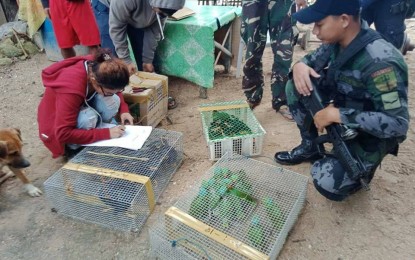
ANTI-WILDLIFE TRAFFICKING CAMPAIGN: File photo shows a personnel of the Palawan Council for Sustainable Development (PCSD) inspecting the talking mynahs and blue-naped parrots confiscated in Rizal town, southern Palawan, in June this year. (Photo courtesy of PCSD)
PUERTO PRINCESA CITY, Palawan -- Law enforcement authorities against wildlife trafficking have intensified their campaign this year to keep under control the decline in the population of critically-endangered and highly-protected species.
This came after a joint team of environmental watchdogs confiscated early Wednesday morning an estimated 202 heads of talking mynah and blue-naped parrot birds in Barangay Quinlogan, Quezon town in southern Palawan.
Jovic Fabello, spokesperson of the multi-sectoral and interdisciplinary body Palawan Council for Sustainable Development (PCSD), said the alleged caretaker of the critically-endangered birds, Joseph Quintayo, was able to escape the actual apprehension at 5:55 a.m.
The first confiscation this year was on June 6 involving 184 talking mynahs, blue-naped parrots, and hornbills in Barangay Punta Baja, Rizal.
“Due to a large number of talking mynahs and blue-naped parrots we have confiscated since June, we are intensifying our campaign further. This is the second time this year that wildlife traffickers have attempted to bring out of Palawan these protected birds,” he told the Philippine News Agency (PNA).
He said their monitoring in 2016, focused on southern Palawan and in 2017, on the northern part of the province. But this year, the intensified campaign against wildlife trafficking will be all over the entire province since they now have two teams helping various law enforcement agencies.
The US Department of Interior is also helping fund the capability training of the enforcers, as well as providing financial assistance.
Tip-offs from the communities have also been strengthened with the help of the BRAIN System or Biodiversity Resource Assessment and Information Network, he added.
“Actually, natutuwa kami dahil nagwo-work na ang information sharing ngayon mula sa mga communities. Ang mga tao sa komunidad, sila ang mga nagpapasa sa amin ng impormasyon tungkol dito sa mga nagsasagawa ng wildlife trafficking (Actually, we are happy that information sharing from the communities is now working. The people in the communities are the ones sending us information about unscrupulous individuals engaged in wildlife trafficking),” Fabello added. (PNA)
